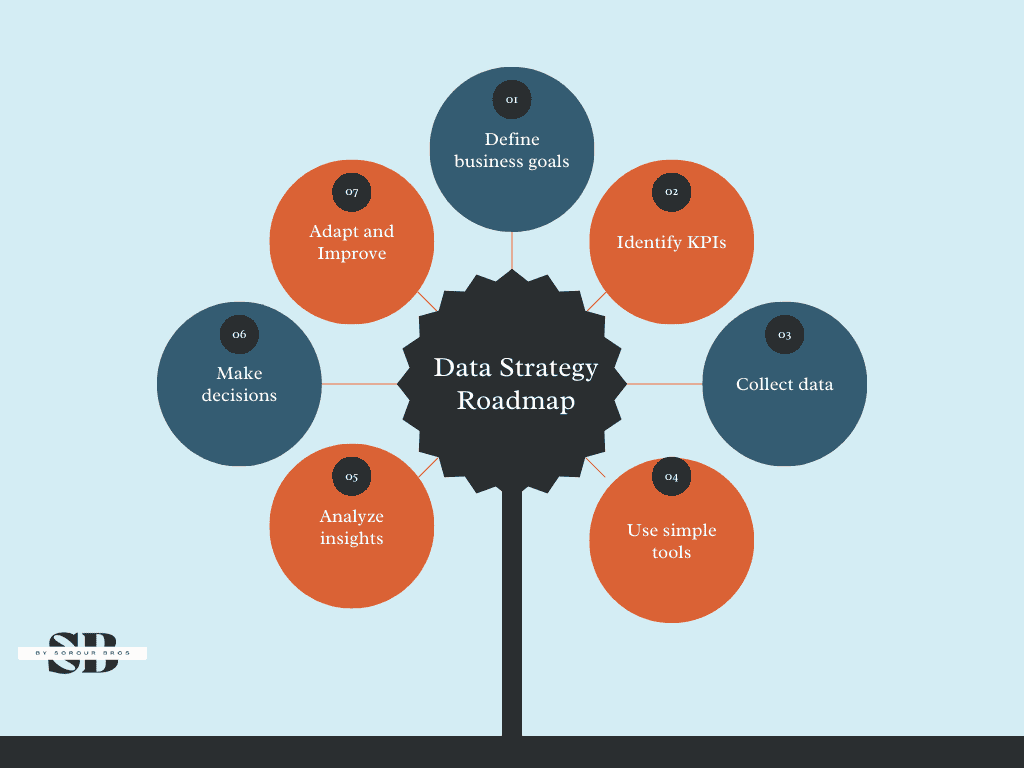Guide to Data Intelligence: How can you get a better advantage?

Written By:
Last Updated Date:
Today, data is the new gold. As a small business owner, you’re sitting on a treasure trove. I will give you a deep breath and stick around. This guide to data intelligence is your map to unlocking the power of data. No pocket protector is required.
Did you know that companies that use data tools are 58% more likely to achieve revenue goals and 162% more likely to exceed them than their competitors?
It matters to us to keep your small business consistent. Understanding and leveraging your data can differentiate between staying afloat and riding the wave to success. This comprehensive guide will demystify data intelligence, showing you how to turn those intimidating numbers into your secret weapon for smarter decisions, happier customers, and a healthier bottom line.
From breaking down data silos to building a data-driven culture, from affordable analytics tools to ethical data monetization, we’ve got you covered. So, grab your favorite beverage, get comfortable, and embark on this data journey together. Trust me, by the end of this guide, you’ll be looking at your business data with new eyes and a newfound confidence.
So, how can you transform your small business with the power of data? Let’s dive in!
Key Takeaways
- Numbers Aren’t Scary: Ever wished for a crystal ball? Your data is it! Start small, like tracking your busiest hour. Soon, you’ll be predicting trends like a pro. No math degree is required!
- Share the Data Love: Knock down those info walls! When everyone’s in the loop, magic happens. Watch your team become idea-spouting superheroes. Together, you’ll crush those business goals!
- Little Details, Big Wins: That tiny customer comment? It could be your next big break! Keep your ears open and your notebook handy. You’ve got insider info the big guys would kill for!
Data Intelligence: Your New Business Superpower
Data intelligence is like having a super-smart business partner who never sleeps. It’s about using information to make smarter decisions, cut costs, and boost profits. When starting a small business, some people rely on gut feelings.
But let me tell you, those days are long gone. Data intelligence has transformed how you run any business. And with the help of good-quality data, you can get actionable insights and more revenue.
The Journey from Data Novice to Data Expert

Remember when you first heard data literacy and felt slightly overwhelmed? I’ve been there too. But here’s the thing: becoming data literate isn’t about turning into a math genius overnight. It’s about understanding the story your data is telling you.
Start small. Maybe look at your busiest hours or best-selling products. Get your team involved, too; fresh eyes often spot things we miss. Trust me, the journey from data novice to data expert is more rewarding than you imagine.
Breaking Down Data Silos: Encouraging Collaboration
Data silos are like those dusty storage rooms we all have, full of valuable stuff but hard to access and use effectively. Also, it makes you blind to the big picture. Breaking down these silos was a game-changer. It will allow you to connect dots you didn’t even know existed, leading to incredible insights and improvements.
Strategies for Eliminating Data Silos
Tackling data silos doesn’t have to be a massive undertaking. Start by fostering a culture of information sharing. Implement user-friendly tools that make data accessible across departments. Encourage cross-team collaboration on data projects.
Remember, the goal is to create a unified view of your business data. While it might initially feel uncomfortable, the benefits of breaking down these barriers far outweigh any initial awkwardness.
Building a Data-Driven Culture: It’s Not Just About Numbers

Creating a data-driven culture in your small business isn’t about turning everyone into number-crunching robots. It’s about instilling a mindset where decisions are backed by evidence rather than just gut feelings.
When you try to implement it, you might see some resistance, but there is a bright future waiting that maybe your employees can’t see yet.
By giving them essential guidance and training, they will support it more and be interested in doing better, especially when they are more comfortable and collaborative. It will be so much better and more effective. This will allow for more actionable insights and better decisions in the long run.
How can we all make our small business successful?
Promoting data literacy is key to building a data-driven culture. Start with introductory training sessions that demystify data concepts. Encourage curiosity about data and reward data-driven insights. Create a safe space for questions and experimentation.
Remember, There may be mistakes, but everyone can adapt and learn from mistakes, mainly when collaborating. This will improve employee happiness and the overall business strategy.
Data Quality Management: Garbage In, Garbage Out
One of the best lessons I learned as a data analyst is that you need good-quality data to get actionable insights. Because when you work with data with low quality or not accurate. As a business leader, you’ll get wrong insights that are genuinely misleading and cause many problems.
Collaboration is a key and effective way to move forward because it ensures that the data is of good quality when you get insights from it, not only from data analysts but also from data scientists. When every team member helps each other, they will get accurate and actionable insights faster.
Data quality management isn’t just for neat freaks; it’s essential for every business. Think of it like keeping your kitchen clean. A little daily maintenance goes a long way in preventing more significant problems down the line.
Implementing Data Governance Best Practices
But it’s not only about data quality. Data governance might also sound fancy, but it’s essential. It’s about setting up rules and processes to ensure data stays accurate and valuable.
Start by defining data quality standards. Assign data stewards responsible for maintaining data integrity. Regularly audit your data for accuracy. Most importantly, making data quality is everyone’s responsibility. When your whole team understands the importance of good data, maintaining it becomes second nature.
Remember to make everything as secure as possible and apply good data ethics. You don’t want everything to go down because some random hacker entered the system. Keep them away by ensuring everything is well-organized and protected.
Data Strategy: Your Roadmap to Success
Developing a data strategy is like planning a road trip. You need to know where you’re heading by planning everything along the way, like the budget when you will start, and how you will do it exactly. You may feel overwhelmed by designing a business strategy.
However, a good strategy starts with clear business objectives. What do you want to achieve? More repeat customers? Better inventory management? Your data strategy should align with these goals. How can you reach them?
Aligning Data Strategy with Business Goals
Your data strategy isn’t just about collecting data. It’s about collecting the right data to drive your business forward. After defining your business goals, identify key performance indicators (KPIs) that align with those goals.

Then, determine what data you need to track these KPIs. Consider how you’ll collect, store, and analyze this data. Remember, a good strategy is flexible. Be prepared to adjust as your business evolves and new opportunities arise.
Small Business Data Analytics: Big Insights on a Budget
Don’t let the term “analytics” scare you off. When I first dipped my toes into data analytics, I thought it was only for big corporations with deep pockets. Boy, was I wrong! Small business data analytics is all about using the information you already have to make smarter decisions.
Start simple, maybe with your website traffic or sales patterns. You’ll be itching to learn more once you see how even basic analytics can impact your business.
Affordable Tools and Techniques for Small Business Analytics
You don’t need a massive budget to get started with data analytics. There are plenty of affordable and even free tools out there. If you have an online business, Google Analytics is a great place to start for understanding your website traffic. Plenty of other tools will also help in different situations.
Many CRM systems come with built-in analytics features. And don’t underestimate the power of a well-crafted spreadsheet. Look for tools that fall within your budget and save money while getting actionable insights. The key is to start small, focus on data directly impacting your business goals, and gradually expand your analytics capabilities as you grow more comfortable.
Harnessing the Power of Small Data
In a world obsessed with big data, let’s not forget the power of small data. As a small business owner, you have a unique advantage – you’re close to your customers and operations. This proximity gives you access to valuable small data that can lead to big insights.
I’m a passionate book reader. I like to read a lot, and I’ve learned that focusing on the small details helps you catch helpful information faster.
The same thing applies to businesses when you pay attention to small details if you’re a small business owner, like customer feedback or employee suggestions, even if you keep a small notebook for small details in your pocket. That will help you stay more agile in the whole business.
Extracting Insights from Small Datasets
When used correctly, small data can be as robust as big data. Start by identifying the small data sources in your business, like customer interactions, sales records, employee feedback, etc. Look for patterns and trends in this data.
Don’t be afraid to get creative. Sometimes, the most valuable insights come from unexpected places. And remember, small data often provides context that big data might miss, giving you a more nuanced understanding of your business.
Data Democratization: Empowering Your Team with Information
Data democratization is about making data accessible to everyone in your organization, not just the “data people.” When I first heard about this concept, I was skeptical. Wouldn’t giving everyone access to data be chaotic? But let me tell You, you’ll see innovation and efficiency skyrocket.
Creating a Culture of Data Accessibility
Implementing data democratization starts with the right tools and training. Invest in user-friendly data visualization tools that make it easy for everyone to explore data. Provide basic data literacy training to all employees.
Encourage a culture where data-driven decisions are valued at all levels. And most importantly, lead by example. When your team sees you using data to make decisions, they’ll be more likely to do the same.
Data Monetization: Turning Insights into Revenue
Here’s where it gets exciting. Your data isn’t just numbers; it’s a goldmine waiting to be tapped. By monetizing your data, you can open up a whole new world of possibilities for your business.
Ethical Considerations in Data Monetization
While data monetization can be lucrative, it’s crucial to approach it ethically. Always be transparent with your customers about their data use and comply with all relevant data protection regulations.
Trust is your most valuable asset; don’t risk it for short-term gains. Consider anonymizing data before monetizing it, and always prioritize your customers’ privacy and trust.
To keep your customers more loyal to your business, consider focusing on their safety, including being careful with their private data and maintaining their trust.
The Future of Data Intelligence: Staying Ahead of the Curve
Buckle up because the future of data intelligence is exciting! AI and machine learning are becoming more accessible to small businesses like ours. Imagine predicting customer behavior or automating complex analyses.
It’s not science fiction; it’s happening now. When I first started exploring these technologies, I was amazed at how they could be applied to small businesses.
Every business can benefit from the tools of the future. Remember, benefitting from them is good, or you’ll be left behind. And I don’t want that to happen to a passionate small business owner like you!
Preparing Your Business for the Data Revolution

Staying ahead in data intelligence requires a commitment to continuous learning. Stay aware of emerging trends and technologies. Consider partnering with tech-savvy advisors or consultants who can guide you.
Start with a chatbot for customer service or a predictive analytics tool for inventory management. Remember, the goal isn’t to adopt every new technology but to find the ones that can benefit you and drive your business forward.
Wrapping up
Embarking on your data intelligence journey might seem daunting, but remember. Every data wizard started as a novice. Take it step by step, learn as you go, and don’t be afraid to make mistakes.
Before you know it, you’ll make decisions confidently and watch your business soar. Your data-driven success story is just beginning! Apply things that benefit your business and help you stay ahead of the curve.
Every business leader has fire inside his soul. Use that to drive you forward. Learn from past mistakes, and do not repeat the same mistakes twice. It’s better to learn from them, develop new ways to avoid them and move forward.
Frequently Asked Questions (FAQ)
I’m a Data Enthusiast and Content Writer with a passion for helping people improve their lives through data analysis. I’m a self taught programmer and has a strong interest in artificial intelligence and natural language processing. I’m always learning and looking for new ways to use data to solve problems and improve businesses.






